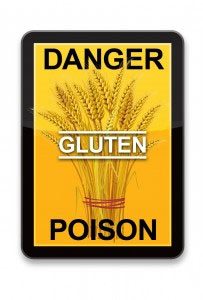Hands Up – Who Needs To Go Gluten Free?
 Why go gluten free? I recently read an article that caught my attention, got me thinking and reacting at the same time. It was an article based on a survey of the American population, specifically for people following a gluten free diet.
Why go gluten free? I recently read an article that caught my attention, got me thinking and reacting at the same time. It was an article based on a survey of the American population, specifically for people following a gluten free diet.
WebMD Health News
Reviewed by Louise Chang, MDAug. 1, 2012 — For a lot of people, gluten free diets are more trend than treatment, a new study shows. The study estimates that 1.8 million Americans have celiac disease. Another 1.6 million are on gluten-free diets, the recommended treatment for celiac disease. Yet there’s almost no overlap between the two groups. “So here’ we’ve got this kind of irony where those who need to be on [a gluten-free diet] aren’t on it, because they don’t know they have it. And those who are on it probably don’t need to be on it, at least from a medical point of view,” says researcher Joseph A. Murray, MD, a gastroenterologist at the Mayo Clinic in Rochester, Minn. “It’s a little frustrating.” Read more of this article here
Why go gluten free – is it more trend than treatment?
What caught my attention was the comment in bold above. I wonder sometimes whether these researchers actually ever speak to real people who have real symptoms. After recently testing positive to auto immune disease, which one is yet to be confirmed, I also recently had my daughter go through the process of going gluten free for suspected Celiacs to discover that she felt much better off gluten, only to find out that she would have to go back on gluten (3 slices of bread for each meal, for 4 weeks) in order to be tested for another indicator.
The process of testing for Celiacs is long and difficult, especially if you find out along the way that going gluten free really does make you feel better.
First there is an Indicator test which tests for genetic disposition for celiac disease. There are 2 antibodies that if you test positive (a blood test) to both then you have a 100% chance of being a candidate for celiacs. My daughter tested positive to one of the antibodies.
Then there is the next Indicator test which involves consuming kgs of gluten in order for the test to work. This is also a blood test but still only an indicator.
Finally there is the endoscopy procedure to inspect the villi on the intestinal wall. I had this procedure 6 years ago when in the throngs of malnutrition, dramatic weight loss, anemia and a host of other symptoms and after 30 biopsies I was told that I must just have IBS (Irritable bowel syndrome).
The facts are that many people with celiacs don’t present all the symptoms and for some people they may not have villi damage – yet! Celiac disease often goes undiagnosed! Many people like myself and my daughter are on a gluten free diet because we feel better and our symptoms subside regardless of whether we have a positive blood test or a biopsy.
When did gluten become so popular anyway?
Our original diet going back 2,000-3,000 years ago was based around meats, fish, fruit, vegetables and dairy with a handful of whole grains. Wheat and especially floured products (biscuits, cakes, pasta, pastry,noodles, crackers, bread) have become pantry fixtures and are now being incorporated more and more into everyday foods. It’s been the onslaught of the world progressing towards a lifestyle of quick, convenient and instant that has brought these items onto the meal table for almost every meal. And as recent as the last 50 years wheat has undergone changes within itself.
In the 1950s, scientists began cross-breeding wheat to make hardier, shorter and better-growing plants. It was the basis of the Green Revolution that boosted wheat harvests worldwide. Norman Borlaug, the U.S. plant scientist behind many of the innovations, won the Nobel Peace Prize for his work. But the gluten in wheat may have somehow become even more troublesome for many people, Murray said. That also may have contributed to what is now called “gluten sensitivity.”
Why Go Gluten Free? Gluten may be the cause of much more than just Celiacs Disease
Research continues to link the autoimmune spectrum of diseases to gluten sensitivity. Leaky Gut is the result of the gut lining being punctured by a substance called zonulin. Zonulin is activated by gluten. Once the gut is “leaky” gluten and other substances can enter the bloodstream and come into contact with parts of the body like the bones, thyroid etc.
Gluten sensitivity is growing at a rapid rate.
The case for gluten sensitivity was bolstered last year by a very small but often-cited Australian study. Volunteers who had symptoms were put on a gluten free diet or a regular diet for six weeks, and they weren’t told which one. Those who didn’t eat gluten had fewer problems with bloating, tiredness and irregular bowel movements.
But the good news is that many people are finding their health far more easier to manage by going gluten free. So it can hardly be called a trend as going gluten free in a world that’s filled with it is not easy. Even though there are more and more gluten free products on the shelf and in restaurants they cost usually twice the price of regular gluten filled produce, making eating with a family an expensive exercise.
So why Go Gluten Free?
What’s the solution: Seeing a doctor or health professional to help diagnose gluten intolerance or sensitivity is recommended, however if you have already been there done that and are no more wiser than before hand you may need to read up, research and self diagnose – at least for the time being. Removing all gluten products from your diet is the first step. Changing your diet to include fresh vegetables, fruit, meats, dairy, alternate gluten free whole grains and some healthy fats and oils – olive, avocado, flaxseed, coconut oil as well as coconut milk, meat and flour. Use supplements such as grape seed extract, vitamin C, vitamin D (preferably straight from the source) and a good probiotic will help with healing the gut and giving an overall feeling of wellness.
What’s your story? Share your comments below about why you went gluten free, gluten sensitivity or intolerance.






























